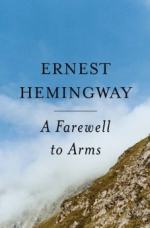|
This section contains 14,261 words (approx. 48 pages at 300 words per page) |

|
SOURCE: Nakjavani, Erik. “Hemingway on War and Peace.” North Dakota Quarterly 68, nos. 2-3 (spring-summer 2001): 245-73.
In the following essay, Nakjavani draws upon philosophy, military history, psychoanalysis, and literary theory to consider Hemingway's treatment of the metaphysics and psychology of war in A Farewell to Arms and other works.
You had read on and studied the art of war ever since you were a boy and your grandfather had started you on the American Civil War.
—Ernest Hemingway, For Whom the Bell Tolls (335)
Prologue
We know that Ernest Hemingway considered the Prussian warrior-philosopher General Karl von Clausewitz the “old Einstein of battles” (By-Line 291). From Hemingway's perspective Clausewitz, the author of On War (1832), a treatise on the theoretics and pragmatics of war, was “the most intelligent writer on the metaphysics of war that ever lived” (Men at War xiv). That is high praise, couched in simple, confident, and knowledgeable language...
|
This section contains 14,261 words (approx. 48 pages at 300 words per page) |

|


